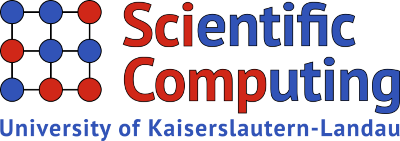Date and Place: Thursdays and hybrid (live in 32-349/online via Zoom). For detailed dates see below!
Content
In the Scientific Computing Seminar we host talks of guests and members of the SciComp team as well as students of mathematics, computer science and engineering. Everybody interested in the topics is welcome.
List of Talks
Event Information:
-
Tue13Jun2017
SC Seminar: Charles Swanson
11:30SC Seminar Room 32-349
Prof. Charles Swanson, NASA Langley Research Center and Old Dominion University, USA
Title:
Transport Equations: Mathematical and Discrete IssuesAbstract:
There is considerable effort to solve the problem of well-posedness, regularity, and global existence for the Navier-Stokes equations. While progress has been made for some particular cases, this Millennium problem remains unsolved in general. These issues also apply to the transport equation or equations for modeling the effects of turbulence. Without this mathematical foundation, one cannot know a priori if there exist a solution or possibly multiple solutions. Currently, scientists and engineers generally rely only upon numerical demonstrations to determine if there exist a realistic eddy viscosity from turbulence models, which primarily depends on solving transport equations. In this presentation, the mathematical and discrete issues concerning a representative two-equation turbulence model are examined. The challenges for convergence in steady state problems as well as unsteady problems, when considering a dual time-stepping algorithm, are discussed. Although the focus will be on a two-equation model, some representative convergence behaviors of a full Reynolds Stress Model (RSM) are also presented. Results are shown for three different airfoil cases at different flow conditions, which includes transonic flow conditions. Various issues in verification
of turbulence models are also briefly considered. A perspective on requirements for an effective and efficient numerical algorithm to solve the transport equations is also examined. In particular, the following issues are considered: (1) stiffness of the governing transport equations, (2) boundary conditions, (3) positivity and realizability, (3) boundary conditions, (4) strong solution algorithms, (5) linear and nonlinear stability, (6) analysis concerning behavior of the transport equations.A pdf version of the slides can be found here.
